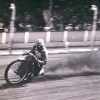-
Posts
11,697 -
Joined
-
Last visited
-
Days Won
32
Everything posted by norbold
-
Not a bad start to your speedway watching career!
-
Johnny Fitzpatrick rode for New Cross at one time. He was actually born in Guernsey, though his family moved to London when he was three and he was always thought of as a Londoner.
-
Just as a preamble to my first race...My family had been well into speedway for a long time, since before the War in fact, and I was actually named after a speedway rider, Norman Parker, Wimbledon Captain at the time. So my family used to talk about speedway and the riders at home a lot and I used to follow the results in the newspapers (yes, they actually had reports and results in those days), and watch the World Final on telly, so I knew quite a bit about speedway and the riders before I ever went. I used to cycle round the big field where I lived and pretend I was Split Waterman or Aub Lawson as they were my boyhood heroes because their names sounded very romantic to me. So, fast forward to my first time at proper live speedway. It was on 11 May 1960 at New Cross, a Britannia Shield match against Norwich, and there, in the very first race, to my absolute amazement were Split Waterman and Aub Lawson! The result of that race: 1. Aub Lawson (W) 2. Jimmy Gooch (B) 3. Split Waterman (R) 4. Harry Edwards (Y). Time 61.6 seconds round the 278 yards New Cross track. Although Ove Fundin scored an 18 point maximum and Aub Lawson 16 paid 17, New Cross won the match 48-42 after having lost their previous five matches on the trot. Jimmy Gooch was the New Cross hero that night, scoring 11 points and being the only New Cross rider to get the better of Aub Lawson. He became my new instant hero!
-
Oh yes, the Krays were wonderful people; they loved their mother and didn't at all threaten, torture and murder people to get their own way. A lovely pair of cheeky East End chappies, unlike all those dark skinned foreigners - every single one of them - who have come to London to be specially violent to old foks. Just go away BOBBATH and take your Fascist insights with you.
-
Londonistan??? What's that supposed to mean?
-
Krzysztof Kasprzak did!
-
When did you reach 30, FD? You kept that quiet!
-
You don't have to scan in anything and send it to them, you just need to cite the date of the Speedway Star it appears in.
-
Billy used to be a regular but hasn't been for 2 or 3 years due to his health.
-
As far as I understand michig is one of the site's administrators.
-
I've been to the Norwich lunch every year for the last 15 years or so. As you say, gustix, a lot of former riders normally turn up, though, sadly, they are getting fewer and fewer every year. Amongst the regulars normally are Ove Fundin, Trevor Hedge, Ginger Abigail, Gavin Hedge, Ray Bales, Bert Harkins and Terry Stone. Len Read was also a regular but missed last year, though as he is over 100 now, I think he can be excused. Other well-known speedway personalities, such as the announcer Terry Ripo and "Hawkeye", Tony Hurren, are also regulars. it is a great occasion. The food is always excellent and the company brilliant. It's non-stop speedway chat and nostalgia for about four or five hours! Well worth going to if you can make it.
-
As a postscript to the debate about citing a reference to the date of Split''s death, I have just looked up a number of other deceased speedway riders on Wikipedia. Although all of them give the date of death, not one of them has a citation.
-
Yes, I've updated many pages before as well. About a year ago I did have the same problem. It was on the page for Stanley Holloway. It was mentioned that he appeared in Concert Party in Clacton when he was first starting out. He actually appeared for three Summer seasons at the West Cliff Theatre, of which I am now Chairman. In our archives we have the old Accounts books for the period 1902-1914. In it, it gives details of how much he was paid each season, so I just thought it might be of some interest to mention how much he was paid on his Wiki Page. So I added it and it was deleted as I didn't source it. So I added the source was the original accounts book in the West Cliff archives. They said that wasn't good enough as it had to be a printed source. Which I thought was very curious as they were willing to accept a secondary source but not a primary soirce.
-
Yes, that's the reason they removed mine.
-
Apparently one of the Wiki Admins has now removed my edit for reasons best known to themselves!
-
Kent until 1964; London since 1965.
-
Yes, it would be in Speedway in the South East. If you don't have a copy, I have a few left at very reasonable prices......
-
It won't be in there if it was a Surrey village.....
-
Who rode for Camberwell in 1805?
-
Indeed, iris. His best days were at Wembley and Harringay. Much more of a North London legend.




